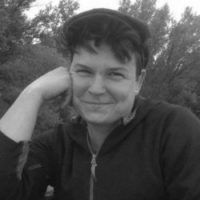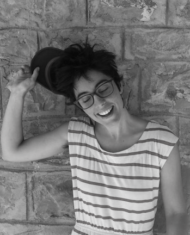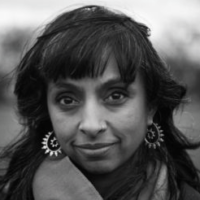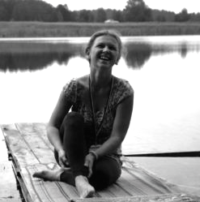Since we launched in 2016 the Ulex coordination team has grown, with the original crew of Gee, Ella, Lindsay and Carol joined by five new members – Eweryst, Lou, Neus, Kat and Sheila. Our logistics and hosting team have also grown with Sana now joined by Sergi and Frida.
As people from a diverse range of cultures and political contexts, we are passionate as a team about supporting others with their activist education pathways. We asked the five new members to share a little bit about their own learning and activism journeys and tell us what brought them to Ulex.
Interviews by Lindsay Alderton
 EWERYST
EWERYST
(they/them)
Born in Poland in the late 80s, Ewe brings a background in grassroots social movements and community organizing immersed in alter-globalisation, animal rights, squatting, anti-fascist and queer-feminist movements. A member of the SPINA Collective, they moved to Catalunya three years ago to begin for the Ulex Project and their specific focus is around LGBTQI activism and anti-oppression work.
What led you to this line of work Ewe?
I’m particularly passionate about intersectionality and figuring out how we can be in solidarity with one another, not only on declarative level but actually building the just world we are dreaming about. I’m also really passionate about welcoming the fullness of our bodies, and with a background in physical theater and dance I have been working on developing ways of working with and through our bodies which enable us to recognise and undo the systems we are socialised into, and to build transformative relationships with ourselves and others to make our collective actions joyful and inspiring. As a trans person I needed to leave my body behind for so many years of my life, and I’m definitely not doing this anymore, not in the struggle for a different reality! I love making it possible for other people to bring their bodies more fully as well and am passionate around developing politicised somatic work.
Tell us about your own learning journey, and what’s bringing your work alive right now?
All my facilitation and training skills have come from informal and popular education and learning by doing. What brought me here is a strong belief in this work and how it brings about change and how we need educational spaces for us to share skills and experiences in our movements. The most important lesson life taught me so far is to delight in not-knowing, tension and the in-between spaces. My current area of study is racial justice and anti-oppression work around race and ethnicity, which in Eastern Europe, where I come from, is an entirely different context Western Europe. My personal learning edge is around conflicts and discomforts, particularly how we might transform them, be transformed by them, and not shy away from them.
Recommended reads/podcasts and inspiring people:
Everyday Feminism – Intersectional Feminism for Your Everyday Life
Healing Justice Podcast
Everything by Olga Tokarczuk
Everything by Ursula Le Guin
Favourite Quote: ‘We found love in the hopeless place’ – Rihanna
 NEUS
NEUS
(she/her)
Born in Castelló de la Plana, and returning to Catalonia in 2018, Neus has spent the last nine years living in Edinburgh and was co-founder the New Leaf Workers Cooperative. Joining the Ulex team in September 2018, Neus’s role includes administrative support, project coordination, taking the lead on some strategic areas of organizational group culture, and support facilitation and training. She also loves a well designed spreadsheet. And geeking out about task managers.
What led you to this line of work Neus?
My political education was set within the context of Valencian/Catalan culture being disregarded/repressed both in terms of linguistic submission in my region, and historically through the dictatorship and the heritage that followed it in terms of fascism and Spanish nationalism. As a child and teenager I grew up writing ‘Fuck Spain’ wherever I could, and getting politisied through the Catalan Countries independentist identity, which at the time was a thing most definitely sitting with lefty radicals.
Setting up the New Leaf Co-op in Scotland taught me a lot about how we can take back control of resources in the current economic context both through worker cooperatives and democratic working conditions, and about taking back control in the current food system, and all the different stages in it. What I like most about my work is the sense of trust and comradeship from supporting each other to get shit done and still be humans. A highlight for me in my work this past year at Ulex was the opportunity to help host a bespoke training for the Landworkers Alliance. Getting to support the work of inspiring farmers, forresters and landworkers who are dedicating their lives to growing food for people in a way that takes care of nature and is aligned with the worldwide landworkers movement fighting for ecological justice, was incredible.
I’m also an organizational geek and really enjoy being the person that is coordinating stuff around team culture and processes, in setting up the structures that support us to thrive. I enjoy being in a project where I know that people deeply care about each other being well both in our work and outside of it.
Tell us about your own learning journey, and what’s bringing you alive in your work right now?
My background was initially in community education and youth work which merged into my activism and looking at alternative and regenerative cultures, building resources that could be cooperatively controlled. Setting up the workers co-op was a major immersive learning experience for me, which included getting my head around how we create viable economic structures which can survive within the current system, and provide us with nourishment and inspiration to create the new world we want to see. I also learned lots about what’s needed for a team to function well and how we can get shit done.
What fascinates me constantly is wanting to learn more about how we can work most effectively together. Sometimes this is challenging because it might not be perceived as ‘typical’ activism, but at Ulex we open up that very question in our trainings and respect all of the different values and aspects that are needed to create a better world. There are many ways to care and nourish a collective vision. As a facilitator I’m excited to share my experience and learnings to support others in their own learning pathways and to help their groups and collectives thrive.
At present my learning edge is centred around reading and learning lots about sex, gender, pleasure and relationships, and finding that very supportive.
Recommended reads/podcasts and inspiring people:
Pleasure Activism: The Politics of Feeling Good
Meg Jon Barker: Life Isn’t Binary and Rewriting the Rules
Meg Jon and Justin podcast
Difficult Conversations and Thanks for the Feedback – Harvard Negotiation Project
Favourite Quote:
Ja no ens alimenten molles, ja volem el pa sencer. Vostra raó es va desfent, la nostra es força creixent. – Ovidi Montllor
(Crumbs no longer feed us, we want the whole bread. Your reasoning is falling apart, our strength is growing.)

SHEILA
(she/her)
Originally from London, Sheila became politicized in her early twenties through friendships with people who were monitoring the UK police around institutionally racist practices in East London. Prior to joining Ulex as a Project Coordinator in Spring 2019, her activism was primarily focused in the UK around grassroots organizing, including the anti-fracking, anti-aviation and anti oil sponsorship movements.
What led you to this line of work Sheila?
My activist education journey stems largely from being involved in grassroots movements, which has given me a real appreciation from the inside out of frontline struggle. Through getting burnt out I had to deal with own mental health issues and learn to find a better way of looking after myself. I’m here because I want to help other activists ‘do activism’ in a way that doesn’t lead to burn out.
Tell us about your own learning journey, and what’s bringing you alive in your work right now?
My journey into activism was through learning by doing. I thought at first that I couldn’t get involved because I hadn’t studied academically, and also because I didn’t have the self-belief that I could do it. What radicalized me was environmental activism. It was through this that I also saw how white the middle class environmental world is. Because of this my current key learning edge is towards changing the narratives of environmental justice so it’s fronted and led by the people who are being impacted the most. This means centering it as a social justice issue, rather than as a byline.
Another pertinent learning edge is around privilege and how we use our privilege so that we might lessen the contribution to inequality. This includes deepening my understanding of work around anti-oppression and allyship, and I’m really inspired by progressive movements such as BLMUK. These issues are crucial to me for as a person of colour, race cannot be sidelined. It comes into everything.
I look for inspiration and learning from the facilitators who run our courses, asking questions and trying to learn from them whilst they’re here. In addition to this the challenges of living in community are a key learning for me, particularly around issues of conflict. Like many I’m resistant to conflict but what I’m learning is that conflict is inevitable, but what’s important is not whether or not there is conflict but more so how we respond to it.
Recommended reads/podcasts and inspiring people:
All About Love – Bell Hooks
Favorite quote:
In a racist society it is not enough to be non-racist, we must be anti-racist. – Angela Davis
The corporate revolution will collapse if we refuse to buy what they are selling – their ideas, their version of history, their wars, their weapons, their notion of inevitability. Remember this: We be many and they be few. They need us more than we need them. – Arundhati Roy
 KAT
KAT
(she/her)
Growing up in Soviet Russia, before and during perestroika, Kat’s childhood was shaped by a country undergoing radical social and economic change. Her political education and activism commenced when she started to travel, on coming into contact with different worldviews and political organizing structures. As a project coordinator with Ulex, Kat joined the team in 2018, and is currently supporting seven project partners to participate in trainings.
What led you to this line of work Kat?
For me this is more than a job, it is a way of life, and in addition to the education centre, a large part of my decision to come here was because of the proximity to nature, and of living in a community in a truly sustainable and low impact manner with the environment. The philosophy that underpins Ulex’s solidarity economy is ‘Take what you need, give what you can’. Growing up in the Soviet Union we were raised with such high principles, but to see this actually happening here in practice at Ulex is kind of mindblowing for me. Very inspiring.
As the only non-European member of the team it hasn’t been easy in getting my residence permit and visa to be able to stay here and work, but what’s really important for me is to work at a place which is aligned with my values. This means making a difference and supporting positive change in the world, as well as helping to build resilience of great people who are putting themselves on the frontlines, pushing for change. I really value this alignment with my core values to make the world a better place. In addition Ulex is truly an inclusive culture, where diversity and difference are welcomed and perceived to be strengths.
Tell us about your own learning journey, and what’s bringing you alive in your work right now?
A highlight this year was participating in our Roots of Resilience training and getting to learn from so many amazing people coming from different places, and to gain first hand insights and understanding about the different movements pushing for change. It’s tremendously inspiring for me hearing about the different struggles.
I love learning, and self-development for me has always been a key driver, particularly around ecology and environmental education. In addition to this, a lot of my path is focused around language learning, and at present I’m focused on Catalan in addition to English and Spanish. My degree was in Economics which feels like a world away from my values and lifestyle now, but in a way it has proven to be helpful as a baseline understanding for how capitalism functions and is structured.
Following on from full immersion into environmental activism and suffering from burnout, my activism is now focused around regenerative culture and how building resilience and awareness can provide grounding and stability through difficult times. A more challenging learning edge at present is coming into contact with my previous history and how I may embody hierarchy and patriarchy, in the hope of transforming that awareness into more inspiring and supportive directions for the future.
From my previous history what is challenging for me is coming into contact with how much hierarchy and patriarchy I’m embodying from my previous history and how that might transform into something inspiring, some new directions for the future. Dance and practices of self-compassion are key for me in finding joy.
Recommended reads/podcasts and inspiring people:
Anything by Joanna Macy
Anything by Miki Kashtan
Anything by Pema Chodron
The Courage to be Disliked by Ichiro Kishimi and Fumitake Koga
Favorite Quote:
‘People were created to be loved. Things were created to be used. The reason why the world is in chaos, is because things are being loved and people are being used.’ – John Green.
 LOU
LOU
(she/her)
Born in Hull, East Yorkshire, Lou trained as a sociologist before coming out to help set up the Ecodharma Centre in 2009. She currently works remotely as the Ulex course coordinator, and is based in L’Escala, Girona Province. Lou helped develop the Regenerative Activism strand of trainings, conducting participatory research about burnout, activist identity and activist cultures, and is now part of the team developing Resourcing Resilience, Working with Trauma. From January 2020 Lou will be returning to full time work in a new two year project to support greater psycho-social resilience amongst people doing migrant solidarity work in France, Italy and Greece.
What led you to this line of work Lou?
Prior to moving to Catalonia I was involved with the UK Camps for Climate Action between 2006 and 2009, including a high profile direct action against Drax, stopping a coal transport train with 28 other people. This led to a two year legal process in which we attempted to legally prove our action was a necessity to prevent catastrophic climate change. It was important but very time consuming, taking me to a point of exhaustion, and following on from the “failure” of the COP 15 in Copenhagen I was burnt out and seeking new, more regenerative political pathways. It was at this point that I joined the newly emerging Ecodharma team and helped support the early years of the Sustaining Resistance Empowering Renewal project, which launched in June 2010. Since then most of my activist work has been focused on themes related to psycho-social resilience.
This work is so meaningful to me because I am working from life experience and my deepest values and inspirations. This is also its greatest challenge – it is so easy to get caught up in your own stuff when you are working on themes that touch deeply into your own life experience. What I most like about it is constant contact with really amazing people doing incredible work.
In common with many people working for Ulex I am called to support people to connect with their sense of ‘agency’ and to feel more empowered. Life has taught me some harsh lessons about loss of dignity and loss of agency during periods when I was unable to value and care for myself sufficiently and to set limits to others. Intersectional feminism and anti-oppression work is key for me.
Tell us about your own learning journey, and what’s bringing your work alive right now?
By training I am a sociologist and I wrote a doctoral thesis in 2006 and worked for several years as an academic in Leeds. Books and research and writing have always been part of my life and I am rarely long without my nose in some book. I read, write and study voraciously.
My inspiration is joining with others to co-create conditions for learning, healing, growth and empowerment. I want to develop and learn educational skills and methods that enable people to feel and sense that other ways of living and being are possible. I feel particularly called to support change from a sensory and embodied level. As a former academic it is sometimes hard to step out of the comfort zone of the intellect, but for me stepping into experiential and body work has been truly transformative. This is what guides my current work and facilitation practice.
Presently I am studying somatic trauma work and training as a TRE provider in order to better support my teaching and facilitation work for Ulex. I am also part of the team developing the training Resourcing Resilience, Working with Trauma, which was a personal highlight of 2019. I am deeply inspired by developing collective, peer to peer, trauma healing work and I hope to continue developing this work for many years to come.
Recommended reads/podcasts and inspiring people:
Reginald Ray’s Dharma Ocean podcasts
Robert C Scaer : The Body Bears the Burden
Pleasure Activism: The Politics of Feeling Good’ by Adrienne Maree Brown
Anything by Audre Lorde
Favorite Quote: Listen to your body; it is smarter than you
READ ON: 8 resilience trainers give their 2 top tips for staying sane in fierce times »»»